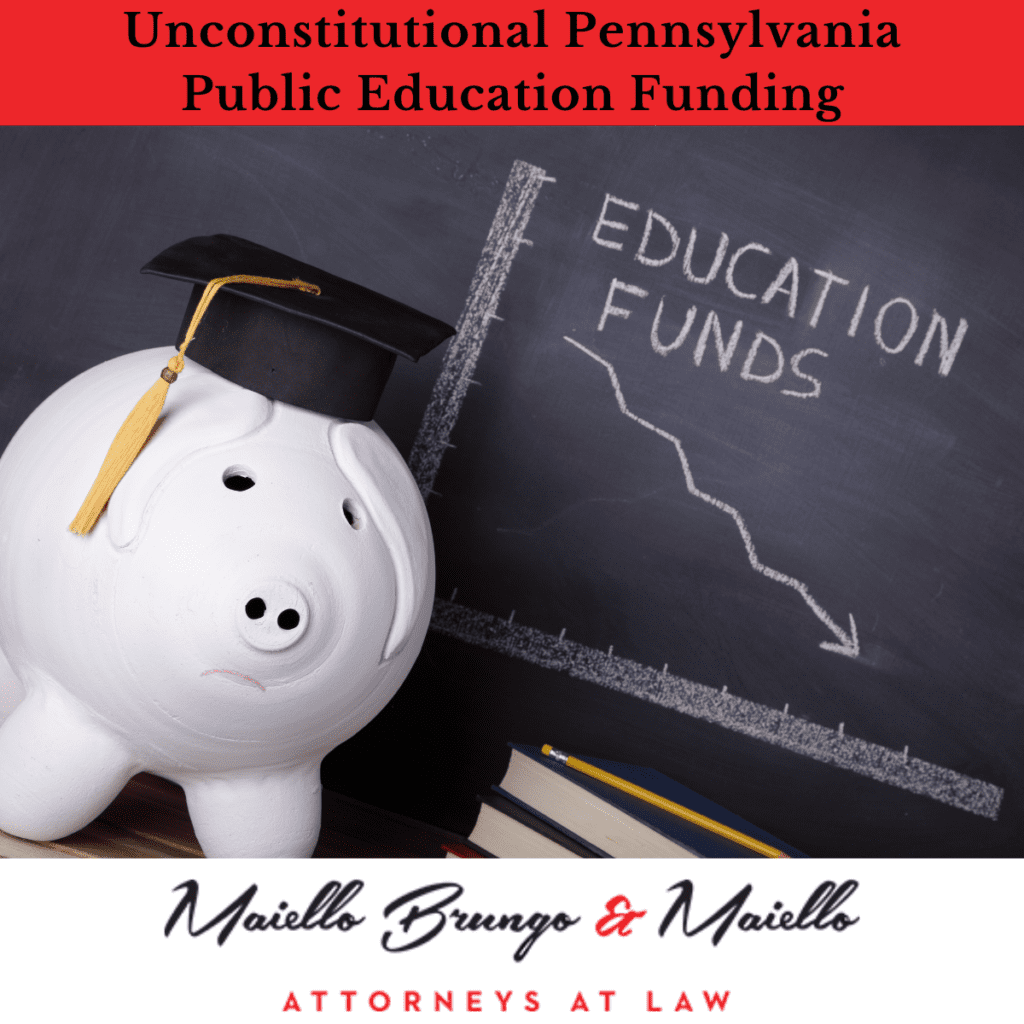On February 7, 2023, the Pennsylvania Commonwealth Court interpreted Art. III § 14 of the Pennsylvania Constitution, known as the Education Clause, to require the Commonwealth to “provide for the maintenance and support of a thorough and efficient system of public education to serve the needs of the Commonwealth.”
In a lawsuit filed over nine years ago by six school districts, a group of parents and children, and two organizations, the Petitioners claimed that the Commonwealth was not investing sufficient funds in public schools, particularly in the lower-wealth school districts, and were thus not meeting their constitutional duties. The Petitioners also claimed that low-wealth districts are not on a level playing field with higher-wealth districts, such that the current funding system violates equal protection principles.
Contact an MBM Law Education Attorney
The Case of Equal Protection Principles
The PA Commonwealth Court concluded that the Education Clause “requires that every student receive a meaningful opportunity to succeed academically, socially, and civically, which requires that all students have access to a comprehensive, effective, and contemporary system of public education.” When applying the constitutional standards to the facts presented in the case, the Court found that there were “manifest deficiencies between low-wealth districts, such as the six Petitioner Districts, and their more affluent counterparts” in areas including funding, courses, curricula, staffing, facilities, and instrumentalities of learning.
The Court held that educators lacked the resources that state officials have identified as essential to student achievement, and that some school districts were even forced to choose which students would benefit from the limited resources provided, despite knowing more students in need of the same resources. Applicable assessments established that achievement gaps between students in a low-wealth district and those students in affluent districts were significantly wide, and even more extreme when subgroups such as Black, Hispanic, ESL students, and other historically underperforming students were examined.
The Court concluded that the Petitioners satisfied their burden of establishing that the Education Clause was clearly, palpably, and plainly violated because of the Commonwealth’s failure to provide all students with access to a comprehensive, effective, and contemporary system of public education that would allow them to succeed academically, socially, and civically.
The Right to Public Education is a Fundamental Right
Turning to the equal protection claim, the Court first began by examining whether the Pennsylvania Constitution contains a right to education, and, if so, the nature of that right, and the level of scrutiny that should apply to that claim. In an attempt to finally settle the debate enshrined in a long line of cases debating this issue, the Court stated: “this Court concludes the right to public education is a fundamental right explicitly and/or implicitly derived from the Pennsylvania Constitution.” Applying strict scrutiny, the Court went on to analyze the facts of this case and concluded that there was an established equal protection violation. No compelling government purpose had been stated to the Court to justify the identified disparities between low-wealth and high-wealth school districts.
Call the Education Attorneys of MBM Law
Findings in the PA Public Education Funding Case
Accordingly, Judge Renée Cohn Jubelirer signed an order declaring in relevant part:
- The Respondents (including the PA Dept. of Ed.; the PA Senate and House of Reps.; the Governor, and others) had not fulfilled their obligations to all children under the Education Clause;
Education is a fundamental right guaranteed by the Pennsylvania Constitution to all children residing in the Commonwealth; - Art. III Section 32 of the Pennsylvania Constitution imposes upon Respondents an obligation to provide a system of public education that does not discriminate against students based on the level of income and value of taxable property in their school district;
- Students who reside in school districts with low property values and incomes are deprived of the same opportunities and resources as students who reside in school districts with high property values and incomes;
- The disparity between districts with high property values and incomes and those with low property values and incomes is not justified by any compelling government interest nor is it rationally related to any legitimate government objective; and
- As a result of the disparities, Petitioners and students attending low-wealth districts are being deprived of equal protection of the law.
The MBM Law Firm is experienced with PA Education Law; learn more about our team of education lawyers in Pittsburgh, PA.
How This Ruling Affects the Future of the PA Public School Districts
President Judge Cohn Jubelirer’s ruling did not provide specific direction to the Legislature regarding the amount of state aid that must be provided or the way it was to be distributed. Rather, it acknowledged that the court was in “uncharted territory” and left the matter to the Governor, lawmakers, and school districts to come up with a plan to address and rectify the constitutional violations.
Current Pennsylvania Governor Shapiro introduced his first budget proposal on March 7, 2023, one month after the decision with a significant increase in education spending. While this issue is almost certain to be appealed to the Pennsylvania Supreme Court, it is possible that the order of the Commonwealth Court may not be stayed in the interim, resulting in expeditious change. However, the petitioners in this case presented evidence that schools are underfunded by $4.6 billion dollars, and that estimate did not account for gaps in spending on special education, school buildings and other facilities.
MBM Lawyers Focused on Pennsylvania Education
Change may be on the horizon, and the experience attorneys at MBM law are attentively monitoring this case. Maiello, Brungo & Maiello, LLP will advise all of our clients as soon as feasibly possible as the matter continues to evolve. Please contact us to learn more about our education legal services.


